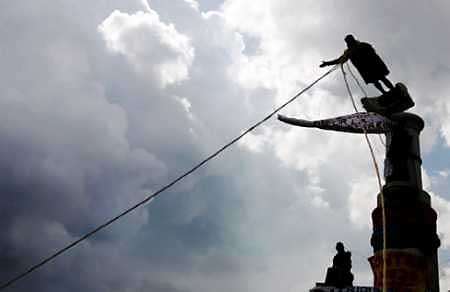By Bill Bigelow
"Right. So who did he find when he came here?" I asked. Usually, a few students would say, "Indians," but I asked them to be specific: "Which nationality? What are their names?"
Silence.
In more than 30 years of teaching U.S. history and guest-teaching in others' classes, I've never had a single student say, "Taínos." So I ask them to think about that fact. "How do we explain that? We all know the name of the man who came here from Europe, but none of us knows the name of the people who were here first--and there were hundreds of thousands, if not millions, of them. Why haven't you heard of them?"
This ignorance is an artifact of historical silencing--rendering invisible the lives and stories of entire peoples. It's what educators began addressing in earnest 20 years ago, during plans for the 500th anniversary of Columbus's arrival in the Americas, which at the time the Chicago Tribune boasted would be "the most stupendous international celebration in the history of notable celebrations." Native American and social justice activists, along with educators of conscience, pledged to interrupt the festivities.
In an interview with Barbara Miner, included in Rethinking Columbus, Suzan Shown Harjo of the Morning Star Institute, who is Creek and Cheyenne, said: "As Native American peoples in this red quarter of Mother Earth, we have no reason to celebrate an invasion that caused the demise of so many of our people, and is still causing destruction today."
After all, Columbus did not merely "discover," he took over. He kidnapped Taínos, enslaved them--"Let us in the name of the Holy Trinity go on sending all the slaves that can be sold," Columbus wrote--and "punished" them by ordering that their hands be cut off or that they be chased down by vicious attack dogs, if they failed to deliver the quota of gold that Columbus demanded. One eyewitness accompanying Columbus wrote that it "did them great damage, for a dog is the equal of 10 men against the Indians."
Corporate textbooks and children's biographies of Columbus included none of this and were filled with misinformation and distortion. But the deeper problem was the subtext of the Columbus story: it's OK for big nations to bully small nations, for white people to dominate people of color, to celebrate the colonialists with no attention paid to the perspectives of the colonized, to view history solely from the standpoint of the winners.
Rethinking Columbus was never just about Columbus. It was part of a broader movement to surface other stories that have been silenced or distorted in the mainstream curriculum: grassroots activism against slavery and racism, struggles of workers against owners, peace movements, the long road toward women's liberation--everything that Howard Zinn dubbed "a people's history of the United States."
For more on Columbus, see Geico Ad Features Columbus in Speedboat and Saving Columbus in Infinity Ring.


2 comments:
Umm. Technically, the experience of Native Americans, Latinos in the New World, and African-Americans is indeed a "Western perspective."
"Western perspective" refers to having the perspective of Western civilization, you know. Not simply living in this civilization aka "the West."
You can live in this civilization without agreeing with its dominant perspective. And that's what many minorities do.
As part of the West, they understand the Western perspective and agree with some of it. They also disagree with some of it and prefer their own indigenous (non-Western) perspectives.
In short, if you think African American, Hispanic, and Native studies simply repeat what mainstream studies say about Western civilization, you're mistaken. Whatever you call their perspective, it's a different one.
Post a Comment